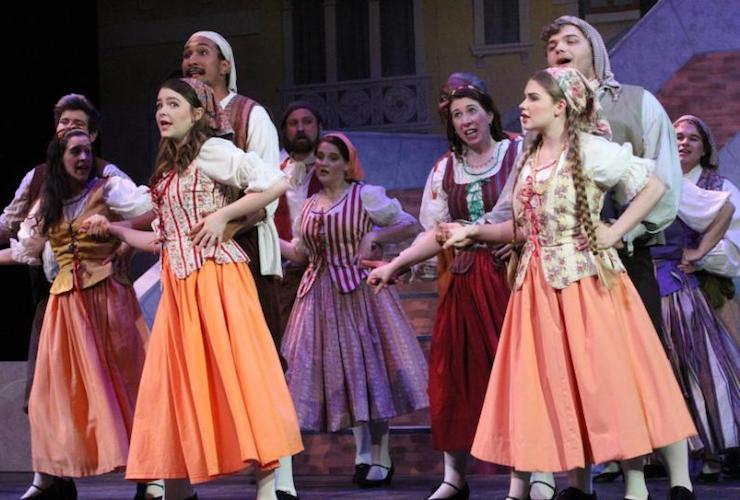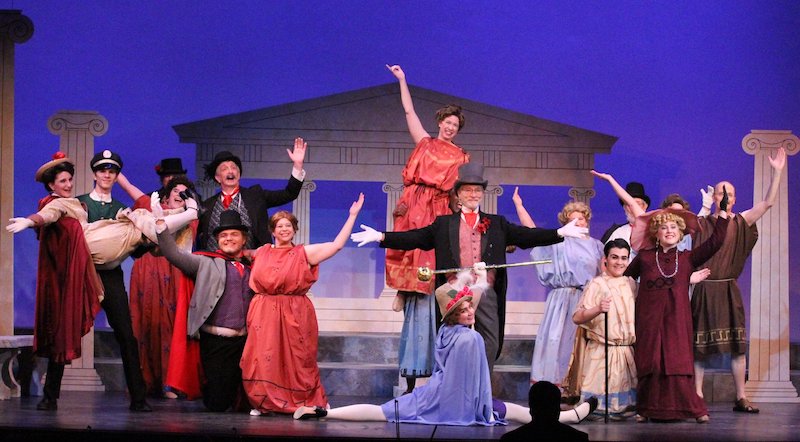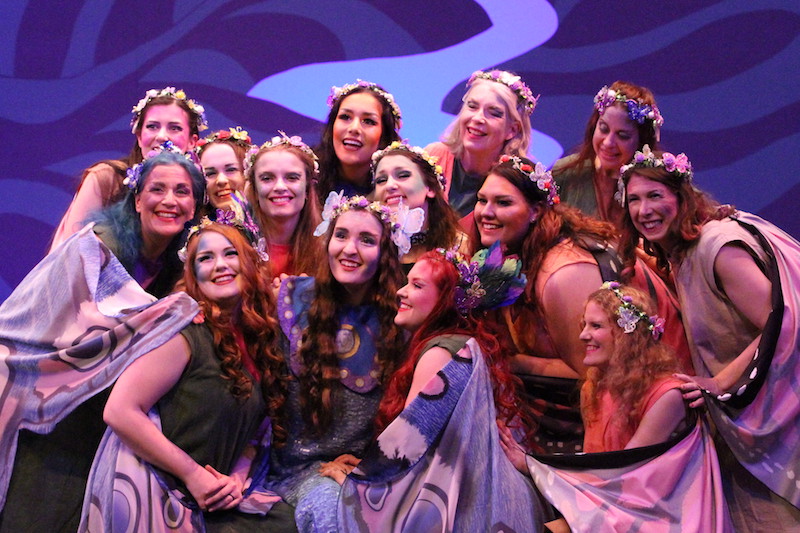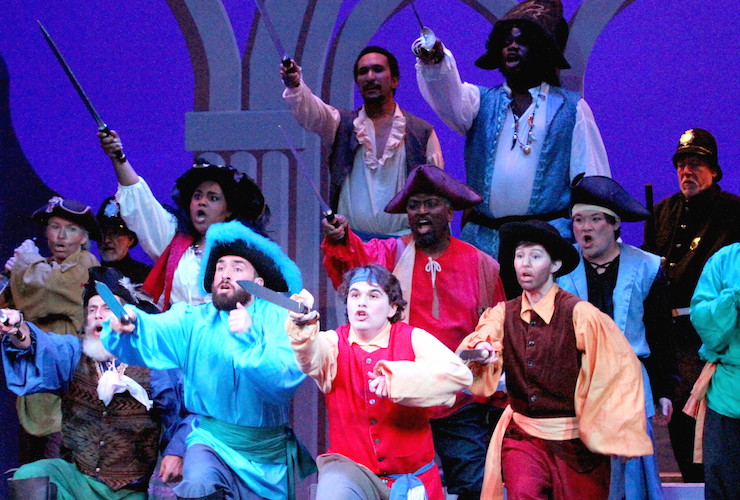UMGASS Delights with "The Gondoliers"

Beloved community institution UMGASS (The University of Michigan Gilbert and Sullivan Society) is back this weekend with a lovely production of Gilbert & Sullivan's last hit, The Gondoliers, or the King of Barataria.
Director and UMGASS staple Lee Vahlsing points out in the show notes that The Gondoliers was the product of a compromise by producer Richard D'Oyly Carte to get another comic opera out of the simmering tensions of the relationship between Gilbert and Sullivan (at the time in 1889, Sullivan had already been knighted by Queen Victoria, but Gilbert would not be knighted until years later, in 1907, by King Edward); if they would collaborate on another comic opera, D'Oyly Carte would produce Sullivan's Grand Opera, Ivanhoe, and he would be taken seriously by high society at last, or something.
At any rate, as Vahlsing notes, this arrangement led to greater collaboration between the two than the rut they had fallen into, and the result is one of their best and most beloved Operettas. Lovingly staged with two charming sets and including truly impressive costuming, the only hint of modernity in this faithful production is a bit of Charleston in the choreography -- and perhaps a touch of Iron Maiden here and there.
About a Century Since: UMGASS tackles The Grand Duke

UMGASS is back this weekend with the last of Gilbert & Sullivan's 14 operettas: The Grand Duke. Originally set about a hundred years before its 1896 debut, UMGASS has gently updated the setting and costumes to about a hundred years ago, in 1907.
Directed by David Andrews and starring a cast of UMGASS regulars along with some fresh faces, The Grand Duke features a play-within-a-play (with a clever, unique twist for true G&S Fans) and the wish-fulfillment theme of a theater company bending the aristocracy to their will through the power of their production (with some help from archaic statutes).
Tripping Hither, Tripping Thither: UMGASS delights with "Iolanthe"

This weekend, the University of Michigan Gilbert and Sullivan Society (UMGASS) stages Iolanthe, bringing Thirsty Fairies, Peer Pressure, and one long strange trip of a dream sequence to the Mendelssohn Theater. Iolanthe is the seventh of Gilbert & Sullivan's 14 comic operettas, steeped in the class divisions and political satire of the day, with a hearty dollop of supernatural weirdness.
Directed by Greg Hassold and featuring an extremely solid pit orchestra led by Thomas Burton, this wonderfully busy production has a lot going on in every scene and is just dripping with the talent of fresh-faced leads, seasoned supporting characters, and a chorus that is plainly having a wonderful time.
Internal Organ: Ann Arbor Concert Band hails the "King of Instruments" at Hill

This Sunday, March Fo(u)rth to Hill Auditorium at 2 pm for a very special performance by the Ann Arbor Concert Band, led by conductor, composer, and organist Jim Nissen. We caught up with Nissen to ask a few questions about this weekend's concert -- "The King of Instruments" -- and why band, organ, and Kubrick fans shouldn't miss it.
A Women's College? Maddest Folly Going!

The University of Michigan Gilbert and Sullivan Society (UMGASS) is one of campus's most venerable and long-lived community arts organizations, and they can be counted on to produce two excellent classic operettas each year. This term, they've taken on Princess Ida, or Castle Adamant; not one of Gilbert & Sullivan's most popular works, but just as delightful and witty as ever.
Directed by David Andrews, a cast of UMGASS regulars and some campus rising stars come together this weekend to stage this story of betrothal, education, evolution, the military, tenure, cross-dressing, and generally singing "hoity-toity" a lot.
David Andrews chooses a setting mostly contemporary to the 1884 debut of Princess Ida and sticks pretty close to the script; there was one clearly added throwaway gag that got a big laugh. Whether this was improv or planned, it worked! U-M Freshman Alexandra Kzeski takes the title role, an unusually forthright and strong G&S heroine, who walls off 100 women in Castle Adamant to form a Women's College. Kzeski has the presence and power to pull off this role and shines in every scene. Christopher Kendall (playing one of the great G&S hero names, PRINCE HILARION) takes the male lead once again and continues to deliver; his mugging, lovestruck dopeyness, and powerful voice have become a staple of recent UMGASS productions.
I hope to see him in several more productions before he returns to his native Llanfairpwllgwyngyllgogerychwyrndrobwilliantysiliogogogoch in Wales. (Stunt Bios are always appreciated.) Some G&S works are powered by pairs, but Princess Ida is heavy on trios, and the leads are joined by UMGASS regulars from the supporting cast to form some outstanding trios. Kendall is joined by his friends and sidekicks, Patrick Takata as Florian, and Sounak Raj Das as Cyril. These are very funny roles hilariously delivered; Takata, in particular, steals several scenes, and the three of them together just nail the back-to-back trios of the first act. Similarly, Ida's soldierly brothers, Arac, Guron, and Scynthius have some of the funniest moments in the production, and their deadpan, bass delivery, solid slapstick, and perfect dishevelment are a highlight. Guron is played by Stephan Lemmer, and Scynthius by Jeff Spindler, and Natan Zamansky as Arac does an outstanding job with the soldierly disrobing solo "This Helmet, I Suppose." UMGASS's stable of regulars is truly deep, including other wonderful performances from Don Regan and Phillip Rhodes as the warring kings, and lots of familiar faces in the chorus. UMGASS newcomer and U-M Alumna Elizabeth Mitchell as Lady Blanche and BGSU student Amanda Williams as Lady Psyche turn in excellent performances and keep the lady undergraduates in order. So, don't miss this brief chance to see one of Gilbert & Sullivan's most wry but underappreciated works at the Mendelssohn Theatre this weekend; where else can you hear heavenly voices sing that "Man Is Nature's Sole Mistake," and even better, that "Darwinian Man, though well-behaved, at best is only a monkey shaved."
Eli Neiburger is Deputy Director of the Ann Arbor District Library and had no business being cast as Ralph Rackstraw in high school. Love levels all ranks, but it does not level them as much as that.
UMGASS presents Princess Ida, or, Castle Adamant, continues December 8, 9, and 10 at the Lydia Mendelssohn Theatre. Tickets are available at Brown Paper Tickets or at the door.
A Model Modern Pirate Musical: UMGASS's "The Pirates of Penzance"

The University of Michigan Gilbert and Sullivan Society (UMGASS) hits the stage at the Mendelssohn Theater again this weekend with what must be their umpteenth production of The Pirates of Penzance. Pirates is far and away Gilbert & Sullivan's best-known work, well-represented in popular culture, as demonstrated by Muppets, Animaniacs, Kevin Kline, and even a complete production in Yiddish.
UMGASS takes Pirates seriously, which is to say, not seriously at all, delivering a delightful community production, loaded with talent and laughs, that stays true to the original work without casting it in amber.
Review: UMGASS Ensorcells Again with The Sorcerer

This weekend, the University of Michigan Gilbert and Sullivan Society (UMGASS) presents their fall production of The Sorcerer at the Lydia Mendelssohn Theater. I love Gilbert & Sullivan, but I've only seen The Sorcerer a few times over the years, so I was eager to see what UMGASS would bring to the show that established the template for more famous G&S operettas.
While UMGASS focuses, to my delight, on relatively traditional productions of these hallowed works, they always bring a little something new, and in this production, Artistic Director Lori Gould has taken the rather bold step of adding a new character. I stowed my pitchfork after it became immediately clear that the addition of a comedic Sorcerer's Assistant was a brilliant choice, adding lots of laughs and clever moments without taking any untoward liberties with the source material. Don't get me wrong, there are definitely some liberties being taken, but all in the audience agreed that such liberties were entirely toward.
Review: Give Three Cheers, and One Cheer More for UMGASS's Production of the Pinafore

OK, so, H.M.S. Pinafore means a lot to me. I was into theater a bunch when I was a kid, and as a sophomore in high school in Overland Park, Kansas, I found myself in the role of Ralph Rackstraw, and found my crush in the role of Josephine. Or maybe she became my crush because she was in the role of Josephine. The 80s are a little blurry these days, but I definitely remember singing Twist & Shout on a parade float. Suffice it to say, this show gives me the FEELS, and I know it like the back of my hand.
So, naturally, I approach many modern stagings of H.M.S. Pinafore with a bit of trepidation. I love the of-the-momentness of Gilbert & Sullivan, and that moment was not the Roaring 20s, or the South Pacific circa 1943, or on the bridge of a Starship, or any such nonsense. I get it, the temptation of a stunty slant on such an endlessly reheated work can be irresistible for cast and crew alike, but I'm in the audience, damme, and I'm here to see something authentic-ish!
Which is why I was so delighted by what must have been the University of Michigan Gilbert & Sullivan Society's umpteenth staging of H.M.S. Pinafore. With the exception of a small amount of clever, harmless nonsense tacked on to the beginning of each act, this was a wonderfully authentic production, with very strong leads and a talented chorus, put on at a rollicking pace with a pit orchestra spilling over into the aisles of the Lydia Mendelssohn Theater.
Tom Cilluffo delivers an outstanding performance as Ralph Rackstraw. I really appreciate that UMGASS does not amplify their cast, and Cilluffo fills the hall with his mastery of the role, going for and easily nailing the high notes that even some professionals pass up. He's very funny as well, in a role that often gets played overly earnestly by high school sophomores in Kansas.
Adina Triolo as Josephine is even more excellent, anchoring the production with her talent and poise, balancing Josephine's ethereal solos with a gift for mugging as appropriate. Gilbert & Sullivan's original productions were famous for eschewing the stilted, heavily-stylized delivery of their time in favor of remarkably natural performances, and Triolo continues that tradition while still shining as a virtuoso in a challenging role. Yeah, so she also looks quite a bit like my high school crush. No, you have goosebumps.
Phillip Rhodes as Captain Corcoran does a great job with some of the show's best songs, and plays especially well with Don Regan, who is refined and funny as Sir Joseph. I will say I was disappointed by Sir Joseph's straightforward aristocratic costume; his frippery is usually a highlight of Pinafore Productions. However, Regan gets big bonus points for pronouncing "clerk" as "clark" to properly rhyme with "mark"; this is a Gilbert & Sullivan shibboleth; those who miss this rhyme should be put to death.
Andrew Burgmayer did an admirable job as Dick Deadeye, physically inhabiting the role thoroughly enough to make it a surprise when he shrugged it off for curtain call. I do wish I could have heard him a bit better, but it's a tough range. He and Rhodes did a wonderful job on "Kind Captain, I've Important Information," perhaps the only duet ever written about a torture implement.
Lee Vahlsing held the entire show together as Bill Bobstay, a role with a lot of exposition to deliver and did an outstanding job on "He is an Englishman." Vahlsing and Cilluffo were joined by U-M freshman and impressive bass Natan Zamansky on the challenging a capella sections of "A British Tar", and they nailed this song where community productions often run aground.
Lori Gould was a perfect Buttercup, adding some great asides to the role, and the director did a careful job to set up Meredith Kelly's Cousin Hebe as a love interest for Sir Joseph, which often seems to come out of nowhere once the social order inevitably goes all topsy-turvy. Surely that's not a spoiler, seeing as how THIS SHOW PREMIERED IN 1878.
All the sailors and sisters and cousins and aunts are well-rehearsed and the choreography is delightful, with some very clever and funny twists without falling into gimmickry.
My only real disappointment with this show was a truly nerdy nitpick; there's a short exchange between Sir Joseph and Hebe near the end that was a recitative in the early productions, but then became spoken dialogue. I don't care if the spoken version has been canon for 130 of the work's 138 years; I love that recitative and would have been thrilled to hear it! What do Gilbert & Sullivan know about Gilbert & Sullivan anyway?
And along those lines, there's an alternate ending where Sullivan added a chorus of "Rule, Britannia" to celebrate Queen Victoria's Jubilee. I love UMGASS's tradition of opening the show with having the audience stand and sing "God Save the Queen," and I was hoping they'd go with the Imperial ending! As you can see, these are very important concerns.
This is a fun, polished, and refreshingly straightforward production of one of the greatest works of musical theater, and a entertaining evening for total fo'c'sle noobs as well as for hopeless Savoy-savvy fussbudgets like me. Whether this is your first experience on the Saucy Ship or your hundredth, you're sure to enjoy the efforts of these safeguards of our nation. Congrats to cast and crew, and thanks for a trip down memory lane.
Eli Neiburger is Deputy Director of the Ann Arbor District Library and had no business being cast as Ralph Rackstraw in high school. Love levels all ranks, but it does not level them as much as that.
UMGASS presents H.M.S. Pinafore continues April 8, 9, and 10 at the Lydia Mendelssohn Theater. Ticket sales have closed online, but tickets will still be available for purchase at the Box Office.
You're Dreaming of a Tuba Christmas

TUBACHRISTMAS was created by Master Tubist Harvey Williams in 1974 as a tribute to his Tuba Sensei, the legendary William J. Bell, who played for Sousa himself and was a foundational part of the rise of Tuba & Euphonium ensembles and repertoire. Now in its 42nd year, TUBACHRISTMAS is a low-stakes collision of Tuba and Euphonium players in 174 cities around the world to play Christmas music arranged for Tuba & Euphonium Ensemble. Irresistible, right?
Well, you'll get your chance to attempt to resist it this Sunday, December 6, at Kerrytown, as TUBACHRISTMAS Ann Arbor descends upon the Farmer's Market for a 2 pm performance, led by local Tubist George Thompson. The Observer covered the 2013 debut of TUBACHRISTMAS at Kerrytown, and they had to admit that "People who expect that a large group of tubas could only produce a loud, murky rumbling are in for a surprise."
TUBACHRISTMAS only comes once a year; don't miss your chance to be blown away by what Tubas can do!
Eli Neiburger is Deputy Director for the Ann Arbor District Library and was responsible for dubbing the Michigan Marching Band Sousaphone Section "The Great Hammers of Thor" after a throwaway line from an episode of Buck Rogers.
TUBACHRISTMAS Ann Arbor happens Sunday, December 6 at 2 pm at the Kerrytown Farmer's Market. Dress for the weather!
Review: Tubas on Film

There's so much going on in town every weekend, it's easy to overlook the multiple waves of consistently astounding student recitals coming out of the UM Music School. But to do so risks missing some extremely rare opportunities to hear top-notch musicians tackle enormously exciting and engaging work, such as last weekend's simply jaw-dropping Celluloid Tubas performance, put on by the University of Michigan's Euphonium and Tuba Ensemble (UMETE), led by visiting conductor and arranger E. Todd Fiegel.
Fiegel and UM Tuba & Euphonium Professor Fritz Kaenzig met as students and have remained friends ever since; Fiegel arrangements and appearances have been periodic features of Octubafest concerts over the years. Fiegel is a lifelong fan of film and film scores, and has brought his challenging and faithful arrangements of famous film themes to brass ensembles across the country through his Celluloid Tubas and Celluloid Brass series. The program for last Sunday's recital at the Stamps Auditorium on North Campus featured eight of Fiegel's arrangements of famous film themes for Professor Kaenzig's ridiculously talented Tuba & Euphonium students, accompanied by a team of five percussionists, each set of pieces played in sync with video.
It's not unheard of for a live ensemble to play along with a video; in fact there are several touring arrangements of video game or film music, such as the Legend of Zelda tour (that comes as close as that town to the south in 2016), and most of these shows use a digital click track in earphones, or a special video feed for the conductor, to show exactly when each beat must happen for the music to stay in sync with the video. The Celluloid Tubas Show utilized no sync tools at all; Feigel simply watched the video on the screen along with the audience, and conducted the ensemble to keep the music matched up with the action. This was an extremely impressive feat, demonstrating Feigel's deep knowledge of the scenes and the scores, and while not every beat was precisely perfect, the musicianship on display by the conductor and the ensemble was simply staggering.
Starting off with a suite of themes from Bruce Boughton's score for Silverado (1985), the richness and warmth of a Tuba & Euphonium ensemble was immediately on display, very well suited to the panorama-evoking score from the film and the Coplandesque open harmonies that are shorthand for cowboy movies. Beef, it's what's for dinner. Feigel carefully set the stage for each section, explaining what was going on with the plot and how the score amplified and reflected the emotions, while lovingly protecting the audience from spoilers, such as that Kevin Kline would not die in the climactic gunfight against Brian Dennehy.
The next piece was a very famous sequence from 1955's The 7th Voyage of Sinbad: the epic Skeleton Fight, scored by Bernard Herrmann, who went on to score most of Hitchcock's best films, including, as Feigel noted, the music-less score of The Birds. The ensemble did an amazing job with a very difficult piece, and my post-millennial 13 year-old son was also astounded by the quality of Ray Harryhausen's entirely hand-animated special effects. Even all these years later, that post-production Skeleton is convincing in a way of which Jar Jar Binks can only dream.
The first half of the concert featured what Feigel described as "Two vocal soloists at the top of their game," in an arrangement he calls It Ain't Over 'til the Fat Instrument Plays. My son and I had this one pegged for What's Opera, Doc? from the moment we got the program in hand, and we were delighted to be right, with the original vocal performances carefully separated from the original music and accompanied by the power of an ensemble of which Wagner could barely have imagined. Also, it was only 5 minutes long, which Wagner certainly could not have imagined.
The second half began with one of the most famous fusions of animation and music ever produced, Paul Dukas' The Sorcerer's Apprentice. Arranging this woodwind-heavy piece for a low brass ensemble truly showed off Feigel's chops as an arranger, as well as the ranges of the performers, but the truly impressive feat was the timing of the very specific, spread out beats at moments in the short, such as when the splintered broomsticks come back to life, or the final potch Mickey receives at the end of the short. Every single pulse of the music is evident in Disney's animation, and the ensemble nailed them all.
Of course, you can't do a program of Movie Music without something by John Williams, and Fiegel brought three outstanding picks from Williams' catalog. Send in the Clones is the score of the final scene of the otherwise execrable Attack of the Clones, where the famous Imperial March is heard for the first time, a piece extremely well suited to the naturally sinister Euphonium. Then, after a beautiful but undeniably maudlin excerpt from Saving Private Ryan, the ensemble launched into Fiegel's vrOOM vrOOM Scherzo, an arrangement of William's Scherzo for Motorcycle and Orchestra that scores Henry Jones Jr. and Senior's escape from the Nazis. One of the best bits of Indiana Jones music, this piece catches every bump and jostle of the scene with the Last Crusade's Nazi Theme underscoring throughout.
But the most impressive achievement of the evening, and the closing number, was Eine Kleine Tubamusik für Roadrunner und Coyote, a very faithful conversion of Carl Stalling and Milt Franklyn's score for the Roadrunner Cartoon Zoom and Bored. The scoring of a Roadrunner cartoon is so distinctive, from the alternating fury and depression of Wile E. Coyote's efforts, to the signature xylophone blinks of confusion, that despite the unusual instrumentation, the score fit right in, from the Beyooooop to the That's All Folks. But you don't have to take my word for it, here's a video of a performance of the arrangement from a previous Celluloid Tubas show at Umich in 2005:
It was a delightful evening of film, commentary, rich tones, and lots of spit. UMETE is one of the most impressive ensembles on campus, and with arrangers like Todd Feigel pushing their boundaries, it's worth taking the time to see what Tubas and Euphoniums can do, without a full band holding them back.
Eli Neiburger is Deputy Director of the Ann Arbor District Library and was one of the worst Sousaphone players in the Michigan Marching Band.
You can stay on top of what the University of Michigan Tuba & Euphonium Studio is up to on their facebook page .


































